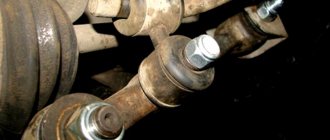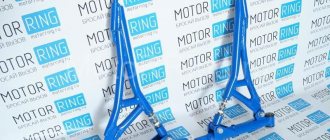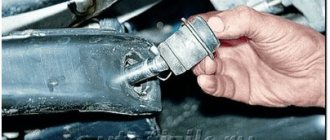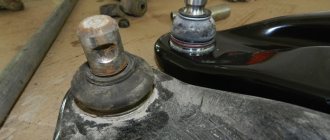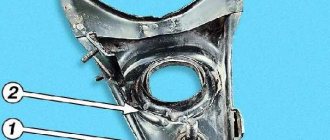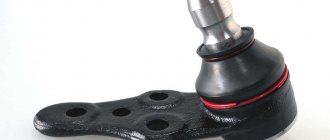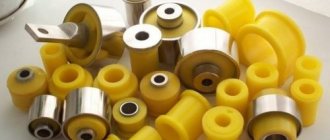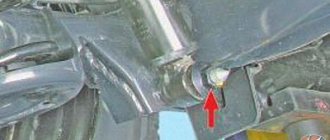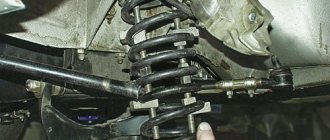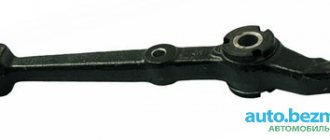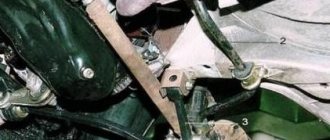Tool:
- Jack or ditch lift
- Open-end wrench 19 mm
- Open-end wrench 24 mm
- Straight box spanner 17 mm - 2 pcs.
- Straight box spanner 19 mm - 2 pcs.
- Curved box spanner 24 mm
- Ball joint puller
- Driver for socket attachment
- Torx wrench attachment E12
- Wheel chock (shoe) - 2 pcs.
- Punch
- Large hammer
- Bench vice
- Chisel
Parts and consumables:
- Silent block of the front suspension arm - 4 pcs.
- Soap solution
Notes:
Remove the lever from the car to replace it or replace the silent blocks of the lever. The work to remove the left and right front suspension arms is similar. Carry out the work on an inspection ditch or overpass.
Removing the front suspension arm
1. Disconnect the ball joint from the control arm as described in this article.
2. Unscrew the nut securing the brace to the front suspension arm and remove the washer as described here.
3. Unscrew the nut of the bolt securing the stabilizer bar to the arm and remove the bolt as described in this article.
4. Using two 19 mm spanners, unscrew the nut of the bolt securing the lever to the body.
5. Using a soft metal drift, knock out and remove the bolt, then move the lever out of the bracket and remove it.
Replacing the silent block of the front suspension arm
1. Place the lever from the silent block in a vice and, using attachments, press it out of the suspension arm.
2. Before pressing in, moisten the new silent block with soapy water.
3. Knock down the silent block of the extension with a chisel on both sides of the lever.
4. Pre-press new silent blocks in a vice and finally press them by striking a punch with a diameter of 8 mm through three windows in the rubber layer.
5. Install the lever in reverse order. Tighten the threaded connections of rubber-metal hinges after removing the jack or ditch lift.
The article is missing:
- Photos of parts and consumables
- High-quality photos of repairs
You can recognize problems in the front suspension system, and more specifically the silent blocks on the Lada Kalina, by the characteristic sounds it makes while driving. Thus, driving on an uneven road may be accompanied by various cracks, squeaks and other unpleasant noises. This situation not only causes great discomfort, but can also cause a more serious malfunction or cause an accident.
Replacing silent blocks on Kalina
Front suspension silent block close up
The silent blocks on the Lada Kalina car are located exactly the same as in the VAZs of previous years. These elements are located generally on or adjacent to the wishbone . You will have to change them either on the entire element at once, or by selecting the most damaged ones. Of course, if there is damage on one of them, the wishbone with rubber (stock – approx.) stabilizers must be removed and replaced with polyurethane analogues.
Removing the wishbone
- In order to begin work on replacing old silent blocks with new ones, you need to place the car on a viewing hole, a lift, or jack it up.
- Next, you need to remove the wheel and spray all the connections on the wishbone with WD-40.
- After the lubricant has penetrated into all hard-to-reach places, we begin to unscrew the bolts.
- First of all, we begin to dismantle the ball joint bolt, but before that we remove the cotter pin from the bolt.
- Then we unscrew the bolt securing the longitudinal tension hinge (where the “daisies” are attached - approx.) and remove it from the seat.
A generously lubricated bolt is a guarantee of success.
When dismantling this unit, there should be no problems.
For the best impact on the bolt, you can use a wrench extension.
Rubber-metal longitudinal tension joint
The rubber-metal longitudinal tension joint, or popularly simply “daisy”, is designed to take the brunt of the impact from uneven road surfaces; despite the fact that this element is very important, it is very easy to dismantle.
- Having previously clamped the lever in a vice, we knock out the silent blocks one by one using a chisel or a thin flat screwdriver.
Punching out “daisies” is not an easy task.
This is what the old suspension elements look like
To cause the least damage to silent blocks, it is better to place pieces of wood between the vices.
Stabilizer strut and cushion
- The stabilizer bar, or simply “eggs,” and the cushion provide the stabilizer bar with stable operation while driving the car.
- It is very easy to dismantle the “eggs”, just unscrew the mounting bolt from the transverse arm, and simply release the other end from the anti-roll bar by simple rocking.
Sometimes it happens that they just break
After unscrewing the fastening, it is very easy to remove the pillow, but putting on a new one is much more difficult.
Cross Arm Bracket
- The largest silent block of the lever located at the very base, despite the fact that it has, among others, more impressive dimensions, is not difficult to dismantle.
- The easiest option to remove it is to set it on fire. When the rubber on it burns out, you just have to take it out and clean the seat. (Of course, you can press it out through a vice, but this will take time and may cause some inconvenience).
How to press out a silent block at home?
Replacing silent blocks is not difficult; for example, I personally became convinced of this when I replaced the silent blocks and shock absorbers on the rear suspension with my own hands. It is for this reason that you can often meet those who decide to independently replace silent blocks at home.
Method 1
First, let's talk about how this should ideally happen. The lever in which it is necessary to replace the silent block is taken, installed under the press on a special stand into which the old silent will be squeezed out, after which a special spacer is installed on top, which will squeeze out the old bushing. This method is used by service stations that have the necessary set of spacers and a powerful press of 10-20 tons.
Method 2
Most motorists, of course, do not have a powerful press, but many have a good vice or jack in the garage. Using a powerful vice, you can successfully squeeze out old bushings using a similar principle - a spacer into which the bushing will go and a spacer that will press on the bushing.
Jack. It would seem, how can a silent block be squeezed out with a jack? Everything is very simple, you need to weld a rectangular frame from some channel or corner at a height slightly higher than your jack and lever. The principle is as follows: we install the jack in the frame, after which we install the lever eye and the two spacers mentioned above on top of the rod. We create the necessary pressure, and the bushing is squeezed out of the seat. It should be noted that in most cases, a 3-5 ton jack is simply not able to cope with such work, so it is better to use 10-15 ton jacks.
Method 3
If you don’t have a jack or a press, and you have an insatiable desire to replace the silent blocks yourself, you can use the third method - using a simple press puller (a pin or a bolt with a nut). The principle is to create pressure by gradually tightening the nut on the stud; this method can be considered analogous to a vice. A pin with a washer of the required diameter is inserted into the eye through the silent block, then a spacer with a washer is put on the other side and the nut is tightened. Rotating along the thread, the nut creates the necessary pressure and forces the silent block to be squeezed into the “receiving” spacer. This “method” requires a strong, hardened stud with the same nut. If the nut or stud is soft, you won't succeed. For example, my pin began to bend due to pressure, after which the thread on the nut was torn off. However, there are thousands of those who managed to replace silent blocks using this particular method. The advantage of this method is its cost-effectiveness and convenience from the point of view of “mobility”, that is, you do not need, for example, to completely remove the entire hub or lever, you just need to have such a primitive press puller.
How to press out/press in a silent block using a press puller video
Method 4
This method can be classified as drastic or extreme measures. It consists in using all known methods and devices to extract the silent block from the mounting socket. The principle is to knock out the old silent block using a powerful screwdriver or a thick wedge-shaped piece of reinforcement. The task is to drive a screwdriver or something similar between the bushing and the silent block, thereby deforming the wall of the bushing inward. After the sleeve is crushed and fed inward, knocking it out is not difficult. Before you start knocking out the silent block, you need to burn out or squeeze out the inner bushing of the silent block and, if possible, any remaining rubber.
How to knock out a silent block using a screwdriver and drill
Method 5
The next method of removing a silent block cannot be called pressing out, since it, like the previous one, does not require the presence of a press; all that is needed is a metal blade, a screwdriver and a hammer. The principle is simple, but not safe. We remove the inner sleeve, then take the blade and start cutting the outer sleeve. We are trying to cut through the old silent block as much as possible without damaging the lever itself or the eye. It is advisable to make two cuts, after which using a flat screwdriver, the silent block is easily deformed and knocked out.
If none of the above methods helped you press out the silent blocks, there is only one way out - entrust this procedure to specialists. To do this, we take the part and take it to a service station, where specialists, using special tools, will press out and press in your silent blocks “in the blink of an eye.”
Important!
If during the work you find that the bolts and nuts are in poor condition (there are cracks, traces of severe rust, bad threads - approx.), then it is best to replace such elements with new ones, using high-quality steel bolts and nuts with a self-locking element .
Other front suspension elements
The remaining elements of the front suspension, which contain rubber-metal and metal hinges, are replaced immediately as an assembly. These include:
- Spherical bearing.
- Stretch bracket.
- Steering end.
These elements cost about 500 rubles per set, and also do not require specific installation skills.
Shock absorber
This element is a damping device.
The shock absorber serves to reduce the range of vibrations of the car body. In other words, the element prevents spontaneous rocking. The work of the shock absorber is based on hydraulic resistance. Inside it there is a liquid of a certain viscosity. It moves through a special valve. Thus, the device absorbs sharp impacts while preserving vulnerable suspension parts. Therefore, the shock absorber is one of the most important components in the chassis. On our roads, this element lasts about 60-80 thousand kilometers. But this period may be shorter, even with careful driving. It is enough just to damage the protective boot, and all the dirt will accumulate in the rod seal. Also note that the damping element changes in pairs. That is, in the event of a breakdown of the rear left shock absorber, the rear right shock absorber also changes. As for the front struts, they are more durable. Often they are replaced already assembled with a spring, since they fail no earlier than after 150-200 thousand kilometers.
Causes of knocking in the front suspension
In total, there are four main reasons why noises and squeaks can annoy the Lada Kalina car owner, and three of them can be eliminated independently and everything can be returned to a safe state.
- The first reason why knocking occurs in the suspension is the poor quality of the road surface . A suspension that is in good working order can also produce some extraneous noise. If the noise disappears when you drive onto a good road, then everything is fine with your suspension, you can move on to the point below.
- If knocking and simultaneous vibration occur in the steering wheel, the reason may lie in a faulty steering rack . If you can tighten the steering rack yourself, then it is better to entrust its repair or replacement to professionals.
- The third reason is the front suspension strut spring that has lost its elasticity . Since the spring tone is significantly reduced, the suspension hits directly against the body. How to change the front struts, and along with it the spring, is described in detail in this article.
- And the last reason is cracked silent blocks, which are simply necessary to thoroughly dampen knocks and vibrations that occur while driving. Read below for information on how to properly replace these front suspension elements.
If you are going to drive a car in winter, it would be a good idea to check the condition of the chassis and transmission so that you do not have to do repairs right on the road, in dirty snow slush. Any Granta owner can save both time and money if they check the car themselves. Today we are talking about the chassis and transmission.
LADA > Granta
Pros and cons of installing a front brace
Part attachment points
Installation advantages:
- the car stays on the road more confidently, takes turns better due to an increase in the level of rigidity of the vehicle;
- more accurate and clear trajectories when turning;
- lower likelihood of age-related cracks on the car body;
- no deformation of the car body when used on uneven roads;
- increased vehicle stability when moving forward.
Disadvantages of installation.
- If there is a possible impact or the stretcher stops on one wheel, the second one also receives a blow. But modern models have special notches so that when an impact occurs, the part itself bends without transferring the impact to the other wheel.
- When using a two-point strut, deformation of the front struts is possible due to uneven distribution of the load on them. As a result, replacement becomes necessary. The driver understands that it is time to replace the front struts when he begins to hear dull clicks from under the wheel arches. This knocking noise is especially pronounced when driving over small bumps.
Granta 38 4 new size
We make sure there is no play (knock). If there is a knock on the front wheel, ask an assistant to press the brake pedal. If the knocking noise disappears, it means the wheel bearing is faulty, and if the knocking noise remains, then the ball joint is most likely worn out.
The hub bearings of the front and rear wheels are not adjustable and must be replaced if there is play.
To check the serviceability of the ball joint, insert a mounting blade between the suspension arm and the ball joint housing. Be careful not to damage the ball joint boot.
The device of the standard suspension of the Lada Priora
The support is secured using 3 nuts to the stand. Due to the presence of a high degree of elasticity, the support is capable of ensuring the rack swings during the operating stroke of the car suspension and vibration damping. The bearing built into the support allows the rack to rotate simultaneously with the wheels.
With the help of the latter, the angle of inclination of the rotation axis is adjusted. The rotary cam is equipped with a closed type bearing. A hub is mounted on the inner rings of the bearing to secure the wheel. The bearing is tightened with a nut on the shank located on the Lada Priora wheel drive housing and is not subject to adjustment. All hub nuts are interchangeable and have right-hand threads.
Granta 39 7 new size
The suspension springs must not be damaged. Tearing, cracking and severe deformation of rubber bushings, cushions and compression buffers of shock absorbers are unacceptable.
Liquid leakage from shock absorbers is not allowed. A slight “fogging” of the shock absorber in its upper part, while maintaining the characteristics, is not a malfunction.
If the rubber element of the upper support of the front suspension telescopic strut settles or is destroyed, the support must be replaced.
Set of parts for mounting the air suspension of Lada Priora
The independent suspension on the Priora is installed on the car yourself, and the installation process is simple. Therefore, every car enthusiast can install air suspension on a Priora if you follow certain tips and recommendations from experts.
- air spring;
- compressor;
- fasteners and braces;
- pneumatic valves;
- pressure gauge;
- start button;
- air supply line;
- air pressure sensor;
- start relay.
In the process of pumping compressed air into the airbag, the ground clearance of the Lada Priora changes. When the pressure in the air bag decreases, the ground clearance of the vehicle decreases. Adjusting the ride height is the main function of the Priora suspension airbag.
An independent suspension is mounted on the Priora using special fasteners and braces. Using these elements, the Lada Priora air suspension is attached to the car body. If you have some skills in working with metal, you can make these parts yourself, but it is best to order these fastening components for the Priora suspension and make them from a specialist. In this case, there will be a guarantee of high-quality manufacturing of components.
To install it in the suspension system on a Priora, you can use the same pressure gauge that is used in pneumatic systems operating at a pressure of a certain range. The start button is designed to adjust the state of the air suspension directly from the interior of the Lada Priora.
Is it possible to make a spacer yourself?
Of course you can, but you should know that spacers are divided into two types:
- adjustable;
- unregulated.
Remember that the spacer must be adjusted specifically to your vehicle.
If you have the patience, you can make them yourself. But remember that if you make them yourself, they will still look different from the branded spacer. Therefore, we recommend that you still buy a spacer in the store. From the statistical data, it can be noted that drivers most often give their preference to “Tehnomaster” and “Autoproduct”.
Installation of rear struts:
First you need to remove the wheel arch trim. Now you need to remove the lids of the glasses (this can be done using keys). Only after this can you install the purchased spacer on the shock absorber cup mounting rods. All that remains is to tighten all the nuts and adjust the spacer. Note! To make it easier for you to adjust them, you can unfasten the rear seat and tilt it forward.
